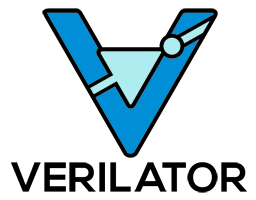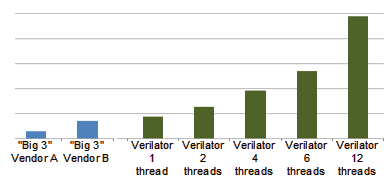run a build and upload a release to GitHub whenever a tag is created. You can simply cherry-pick the latest commit on top of a real Verilator release and create a tag from that.
# Note: You should replace 4.028 with whichever version you are trying to use.
git remote add verilator [email protected]:verilator/verilator.git
git fetch verilator
git checkout v4.028
git cherry-pick origin/master -X theirs
# git will likely want you to resolve the fact that the README.adoc and
# .travis.yaml files are not in the repo here.
git add README.adoc
git add .travis.yaml
git cherry-pick --continue
git tag 4.028-0sifive1
git push origin 4.028-0sifive1For posterity, the old master branch from this SiFive fork with the old
instructions for performing a release is available at
https://github.com/sifive/verilator/tree/old-master-2018-02-02.
Welcome to Verilator, the fastest free Verilog HDL simulator.
|
|
Fast
|
|
Widely Used
|
|
Community Driven & Openly Licensed
|
|
Commercial Support Available
|
Verilator is invoked with parameters similar to GCC or Synopsys’s VCS. It "Verilates" the specified synthesizable Verilog or SystemVerilog code by reading it, performing lint checks, and optionally inserting assertion checks and coverage-analysis points. It outputs single- or multi-threaded .cpp and .h files, the "Verilated" code.
The user writes a little C++/SystemC wrapper file, which instantiates the "Verilated" model of the user’s top level module. These C++/SystemC files are then compiled by a C++ compiler (gcc/clang/MSVC++). The resulting executable performs the design simulation. Verilator also supports linking its generated libraries, optionally encrypted, into other simulators.
Verilator may not be the best choice if you are expecting a full featured replacement for NC-Verilog, VCS or another commercial Verilog simulator, or if you are looking for a behavioral Verilog simulator e.g. for a quick class project (we recommend Icarus Verilog for this.) However, if you are looking for a path to migrate synthesizable Verilog to C++ or SystemC, and your team is comfortable writing just a touch of C++ code, Verilator is the tool for you.
Verilator does not simply convert Verilog HDL to C++ or SystemC. Rather than only translate, Verilator compiles your code into a much faster optimized and optionally thread-partitioned model, which is in turn wrapped inside a C++/SystemC/C++-under-Python module. The results are a compiled Verilog model that executes even on a single-thread over 10x faster than standalone SystemC, and on a single thread is about 100 times faster than interpreted Verilog simulators such as Icarus Verilog. Another 2-10x speedup might be gained from multithreading (yielding 200-1000x total over interpreted simulators).
Verilator has typically similar or better performance versus the commercial Verilog simulators (Carbon Design Systems Carbonator, Modelsim, Cadence Incisive/NC-Verilog, Synopsys VCS, VTOC, and Pragmatic CVer/CVC). But, Verilator is free, so you can spend on computes rather than licenses. Thus Verilator gives you more cycles/dollar than anything else available.
For more information on how Verilator stacks up to some of the other commercial and free Verilog simulators, see the Verilog Simulator Benchmarks. (If you benchmark Verilator, please see the notes in the Verilator manual (PDF), and also if possible post on the forums the results; there may be additional tweaks possible.)
Verilator is a community project, guided by the CHIPS Alliance under the Linux Foundation.
We appreciate and welcome your contributions in whatever form; please see Contributing to Verilator. Thanks to our Contributors and Sponsors.
Verilator also supports and encourages commercial support models and organizations; please see Verilator Commercial Support.
-
GTKwave - Waveform viewer for Verilator traces.
-
Icarus Verilog - Icarus is a full featured interpreted Verilog simulator. If Verilator does not support your needs, perhaps Icarus may.
Verilator is Copyright 2003-2020 by Wilson Snyder. (Report bugs to Verilator Issues.)
Verilator is free software; you can redistribute it and/or modify it under the terms of either the GNU Lesser General Public License Version 3 or the Perl Artistic License Version 2.0. See the documentation for more details.






